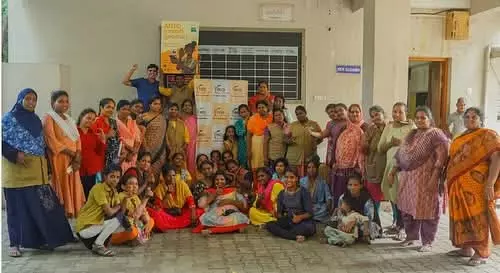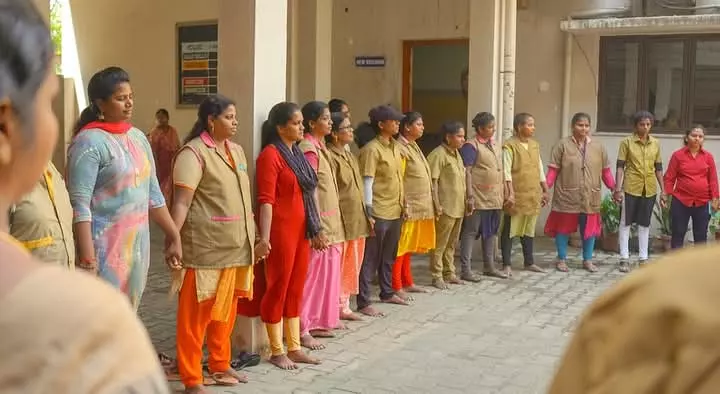
- Home
- India
- World
- Premium
- THE FEDERAL SPECIAL
- Analysis
- States
- Perspective
- Videos
- Sports
- Education
- Entertainment
- Elections
- Features
- Health
- Business
- Series
- In memoriam: Sheikh Mujibur Rahman
- Bishnoi's Men
- NEET TANGLE
- Economy Series
- Earth Day
- Kashmir’s Frozen Turbulence
- India@75
- The legend of Ramjanmabhoomi
- Liberalisation@30
- How to tame a dragon
- Celebrating biodiversity
- Farm Matters
- 50 days of solitude
- Bringing Migrants Home
- Budget 2020
- Jharkhand Votes
- The Federal Investigates
- The Federal Impact
- Vanishing Sand
- Gandhi @ 150
- Andhra Today
- Field report
- Operation Gulmarg
- Pandemic @1 Mn in India
- The Federal Year-End
- The Zero Year
- Science
- Brand studio
- Newsletter
- Elections 2024
- Events
Chennai women ‘drive’ the extra mile to empower families, educate kids

Forty-three-year-old M. Nalini always dresses in a spotless white salwar kameez. The white outfit has given her a new identity — that of a cab driver. If you turn the clock back ten years, she was just another homemaker and mother of two school-going children. Her soft hands knew only cooking, cleaning the house, and stringing flowers to earn a few rupees to buy snacks for her children....
Forty-three-year-old M. Nalini always dresses in a spotless white salwar kameez. The white outfit has given her a new identity — that of a cab driver. If you turn the clock back ten years, she was just another homemaker and mother of two school-going children. Her soft hands knew only cooking, cleaning the house, and stringing flowers to earn a few rupees to buy snacks for her children. But when her family couldn’t afford to send the children to a good school, she chose to learn and earn through driving — something she had never imagined.
When Nalini learned about free training being provided to women by a voluntary organisation and a taxi company, her two daughters encouraged her to take up driving as a profession.

“Friends, relatives, and my family members made fun of me. Some comments were painful. I gained weight because of thyroid issues, but my relatives said I wouldn’t fit into a car because of being fat. I cleared the driving test with the same exam fever as my children,” recalls Nalini.
Now, Nalini wants to undergo further training to improve her driving skills and seek job opportunities abroad. Veera Pengal Munnetra Sangam (VPMS) — a union for women in transport services — has united hundreds of women drivers like Nalini. They drive taxis, autos, and bikes. They share their stories, gain knowledge about vehicles and driving rules, learn to repair vehicles, and also seek legal help through the union.
“I learnt about foreign job opportunities through the union. It's like a sisterhood network. We gather to celebrate, cry, and support each other morally,” said Nalini.
Auto driver A. Mohana Sundari (39), who had worked in various voluntary organisations and served underprivileged families by providing provisions during the COVID-19 pandemic in 2020, managed her expenses thanks to her driving skills. She decided to bring more women like Nalini into the transport sector for livelihood and also unite them to receive benefits such as health insurance and provident fund.
“This five-year-old union, whose membership is close to 500 now, has united women who ride bikes, autos, and taxis using private ride-sharing apps in Chennai. Several private apps have provided platforms for women drivers to earn their livelihood but fail to provide insurance, health checkups, and safety gear. I decided to raise my voice for women like me through a union,” said Mohana Sundari.
With the support of voluntary organisations, Mohana Sundari managed to convince a private insurance firm to offer subsidised premiums for women drivers.

“Over 70 per cent of drivers in our union are single parents. They receive no support from their husbands or in-laws. There have been cases where women were forced to leave their homes with their children in the middle of the night and were left stranded on the streets. Our union provides an emergency fund, provision kits, and small interest-free loans. We also raise awareness in the women drivers’ community to seek legal help during tough times,” says Mohana Sundari, explaining the power of the ‘She’ network.
Yellow-and-black coloured autos are a part of Chennai’s landscape. You can spot an auto on many streets and in public places. Dozens can be seen outside railway stations and on main roads. While many male auto drivers in Chennai pay their unions to take rides from specific ‘auto stand’ spots, women auto drivers are fewer in number and are often not encouraged to join such unions. With VPMS now taking shape in Chennai, these women drivers are transforming the city’s transport sector.
VPMS members meet once every two weeks and also assemble for monthly meetings. They post awareness videos on an exclusive social media page for the union. Members are briefed about annual plans and activities.
Thirty-one-year-old K. Valli works as a delivery agent with Swiggy using her bike. She ensures her two-wheeler is clean and always in perfect working condition. “I want to deliver all packages on time. I deliver almost 22 packages a day. Some customers are happy and encourage me for working as a delivery agent. I’m currently learning to drive an auto to increase my earnings,” said Valli.
After joining the union, Valli was able to overcome many doubts related to traffic rules and vehicle repair. “Our union members are kind and helpful. I was hesitant to ask anything earlier, but now I’m confident about seeking help,” she says with a smile.
Members, in age group from 24 to 50, share bookings through a WhatsApp group. They function like an app-based service, as not all drivers get bookings through ride-sharing apps consistently.
“If one of our drivers with a fixed pick-up and drop-off service faces an emergency, another driver is arranged immediately. Our customers are very happy with the timely and dedicated service of women drivers. Parents have even shared feedback saying they feel safer when their children are picked up and dropped off by women drivers,” says auto driver Mohana Sundari.
Many of these drivers learned driving when they couldn’t afford school transport or needed to pay school fees. During their conversation with The Federal, they shared that driving autos, taxis, and bikes has helped them earn a decent income and become more independent.
Vijayalakshmi has been driving an auto for the past six months. She wanted to earn her own money rather than depend on her husband. Vijayalakshmi chose to drive an auto because it allowed her to work according to her own schedule. “My children are my top priority. I pick and drop them at school on time. If I worked in an office, I wouldn’t have had any control on my work timings. Driving has empowered me and also given me time for self-care,” says Vijayalakshmi.
A driver can earn a minimum of Rs. 20,000 to Rs. 25,000 per month based on the trips. They can also drop their children at school without extra cost. When they secure fixed contracts with corporates, their financial burden is eased. Some corporate firms in Chennai have decided to employ women taxi drivers to pick and drop women employees. VPMS members are now demanding that private and government departments employ women drivers to ensure safe travel for staff and provide an earning platform for many single women.
Take the case of A. Leelarani (47), who is proud to educate her daughter at a prestigious private school in Chennai using only her earnings. “My daughter studies in the same school where former Chief Minister Jayalalithaa studied. I’m illiterate, but I decided my daughter should get quality education. I enrolled her in a popular school and promised the school that I would pay her fees without fail. I saved every rupee through hard work, and I’m happy,” says Leelarani with pride.
“Gone are the days when women depended on men to travel,” Leelarani added. “These days, you see scores of mothers driving their children to school in cars and on bikes. Learning to drive makes you mobile. You can go anywhere in the world on your own. My auto is my friend, well-wisher, and my love,” says Leelarani, who wears a neatly ironed khaki uniform as her regular attire.
In 2024, the VPMS team participated in a business model innovation competition at IIM Kozhikode. Their plan to establish a cooperative with union members was recognised as the best entry in the competition. “We were surprised when we won the award. It boosted our confidence and spirits. Many new members have joined in recent months. Our cooperative will soon be launched in a grand manner,” said Mohana Sundari.
